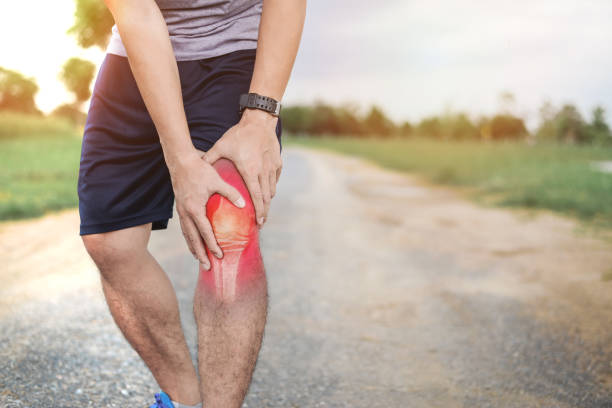Ever stood up and felt a sharp pain in your knee? Or maybe your knees ache when you walk, and you have no idea why. Knee pain is pretty common, but it’s not always easy to figure out what’s causing it. The good news? There are things you can do to feel better, and we’re going to break it all down in a way that actually makes sense.
What’s Causing Your Knee Pain?
Your knees are like the shock absorbers of your body. They take on a lot of pressure every time you walk, run, or even stand still. Over time, that wear and tear can lead to pain. But knee pain isn’t always about getting older—there are lots of reasons why it happens.
1. Arthritis (Yes, Even Younger People Can Get It)
When people hear “arthritis,” they usually think of older adults. But arthritis just means inflammation in the joints, and it can happen to anyone. The most common type that affects the knees is osteoarthritis, which happens when the cartilage in your joints wears down. This makes movement feel stiff and painful. If your knees feel sore in the morning or after sitting for a while, arthritis could be the reason.
If arthritis is making your knees ache, it’s important to get the right kind of help. Places like Arthritis Knee Pain Centers specialize in treating joint pain, helping people stay mobile without relying on surgery. They offer non-surgical treatments designed to reduce pain and improve joint function, so you can stay active without constant discomfort.
2. Injuries That Never Fully Healed
Ever twisted your knee the wrong way or landed hard while playing sports? Sometimes, knee injuries don’t heal as well as they should, leading to pain that sticks around. Old injuries can cause weak muscles, unstable joints, or even early arthritis. If you’ve had an injury in the past and your knee still doesn’t feel right, that could be a clue.
3. Too Much (or Too Little) Movement
Knees need a balance of movement. If you’re super active and constantly running or jumping, your knees can wear down faster. On the other hand, if you sit too much, the muscles around your knees get weak, which makes the joints work harder than they should. Both extremes can cause pain.
4. Being Overweight
Knees take on extra pressure when you carry more weight. Every extra pound adds more strain to your joints, which can make knee pain worse. Losing even a small amount of weight can take a lot of stress off your knees and reduce pain over time.
How to Make Your Knees Feel Better
No one wants to deal with knee pain forever. The good news? There are plenty of ways to help your knees feel better, and you don’t have to do anything extreme.
1. Strengthen the Muscles Around Your Knees
Your knees don’t work alone—they rely on the muscles around them for support. If your thigh and calf muscles are weak, your knees have to work harder. Exercises like leg lifts, squats (without weights), and walking can help build strength. Stronger muscles mean less pressure on your joints.
2. Keep Moving (But Be Smart About It)
If your knees hurt, you might want to avoid moving too much. But too much rest can actually make things worse. Low-impact activities like swimming, biking, or walking help keep your joints moving without putting too much strain on them.
If running or jumping makes your pain worse, try switching to activities that are easier on your joints. Movement is good—just find the right kind.
3. Ice, Heat, and Elevation
Sometimes, simple things work best. Ice can help with swelling, while heat can loosen stiff joints. If your knee is swollen, try icing it for 15 minutes a few times a day. If it’s stiff, a warm compress or heating pad can help.
Keeping your knee elevated (propped up on a pillow) can also reduce swelling. It’s a small thing, but it can make a big difference.
4. Wear the Right Shoes
Your shoes affect your knees more than you might think. Wearing the wrong kind—especially ones with no support—can throw off your alignment and make knee pain worse. Supportive, cushioned shoes (or even custom insoles) can help take pressure off your knees and make walking more comfortable.
5. Lose a Few Pounds (If Needed)
If extra weight is making knee pain worse, losing even 5 to 10 pounds can make a difference. It reduces the pressure on your knees and helps slow down joint damage. You don’t need a crash diet—small, steady changes in how you eat and move can help.
When to See a Doctor
Not all knee pain needs medical treatment, but sometimes, it’s a sign of something more serious. If your knee pain:
- Lasts for weeks and isn’t getting better
- Feels unstable or like it might give out
- Is swollen and red for no clear reason
- Hurts even when you’re not moving
…then it’s probably time to see a doctor. Waiting too long can make things worse. Getting the right treatment early can help prevent bigger problems later.
Your Knees Matter—Take Care of Them
Knee pain can be annoying, but you don’t have to just deal with it. Figuring out the cause, staying active, and making small changes can help you feel better. The sooner you start taking care of your knees, the longer they’ll keep you moving without pain.
Do you have knee pain? Don’t ignore it—your future self will thank you.


